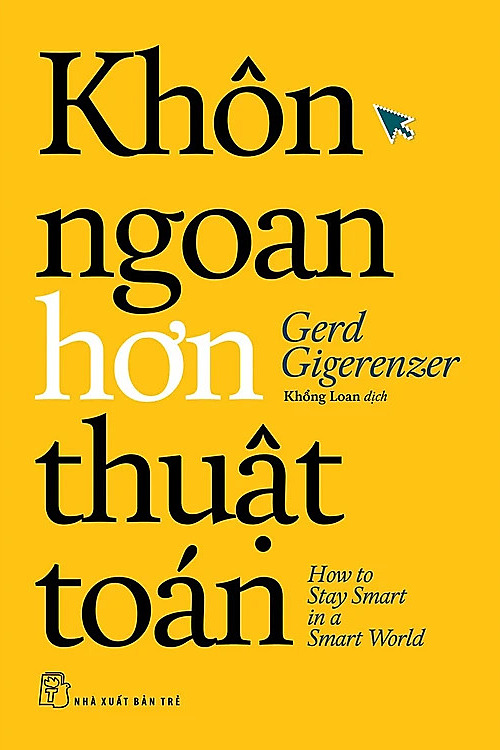Psychologist Gerd Gigerenzer wrote "How to Stay Smart in a Smart World" to help readers become "digitally astute citizens" in a world increasingly shaped by AI. The book is divided into two parts: the relationship between humans and artificial intelligence, and high-risk situations. Gigerenzer explains what AI can and cannot do, and how to maintain control in a world saturated with algorithms.
 |
The cover of "How to Stay Smart in a Smart World". Photo: NXB Tre
The book envisions a future with virtual assistants that outperform humans in every task. People relinquish all personal decisions, from financial management and composing messages to choosing partners, to these assistants. "Soon, tech companies will run your life, and that loyal virtual assistant will morph into a superintelligence. Our descendants will be like sheep, either blissfully welcoming or cowering before their new masters," the book warns.
However, Gigerenzer argues against fear-mongering. People tend to believe tech companies' claims that machines perform tasks more accurately, quickly, and cheaply. Even authors who predict a dystopian future where robots understand everything about humans often portray AI as omniscient. This creates polarized debates, with one side embracing AI and the other fearing its consequences.
Gigerenzer believes both sides are wrong. He argues AI excels only in specific areas, such as processing vast amounts of data and making rapid decisions. It lacks the capacity for improvisation and creativity.
For example, AI can help someone find a partner through dating algorithms, but it cannot navigate the complexities of a long-term relationship. He uses the analogy of chess, where each piece has a defined role. In online dating, matching is based on profiles, which people tend to embellish. Profiles fail to capture the nuances of human personality. Therefore, while technology can handle stable situations, human intelligence has evolved to address uncertainty, independent of existing data.
Furthermore, global education programs focus on improving digital literacy by providing tablets and smartboards and teaching students how to use them. However, they rarely address the associated risks. Evidence suggests that digital natives (those born during the information age) struggle to distinguish between disguised advertisements and genuine news, are easily misled by website interfaces, and fall prey to fake news.
Gigerenzer asserts, "We must benefit from AI in tasks where it performs better and faster than humans without being misled."
To avoid being manipulated by misinformation, readers should adopt the practices of professional fact-checkers. When visiting any website, skim the content and then compare it with other sources. Identify the organizations or individuals behind the information. "The first result on a search engine isn't necessarily the most relevant; it might be a disguised advertisement." Carefully read the text to verify the information and the article's perspective.
"Staying smart means understanding the potential risks of digital technology and remaining proactive in an algorithm-filled world," the book advises.
The book offers strategies and methods for readers to stay in control and avoid being swept up by the AI whirlwind. It encourages self-reliance, recognizing the value of emotions and intuition, and emphasizes understanding the environment to make optimal choices.
According to New Scientist, Gigerenzer draws on personal experience and research to analyze the limitations and risks of technology in general and AI. In some sections, the book doesn't clearly differentiate between digital technology, smart technology, algorithms, and AI, which can be confusing for readers.
Dr. Gary Klein recommends the book, saying it offers a valuable perspective on AI for those concerned about its potential dangers.
 |
Author Gerd Gigerenzer. Photo: European Research Council
Gerd Gigerenzer, 77, is a German psychologist and Honorary Director at the Max Planck Institute for Human Development. He has trained judges, doctors, and managers in decision-making and understanding uncertainty. He is the author of several books, including Gut Feelings (2007) and Risk Savvy (2013).
Chau Anh











